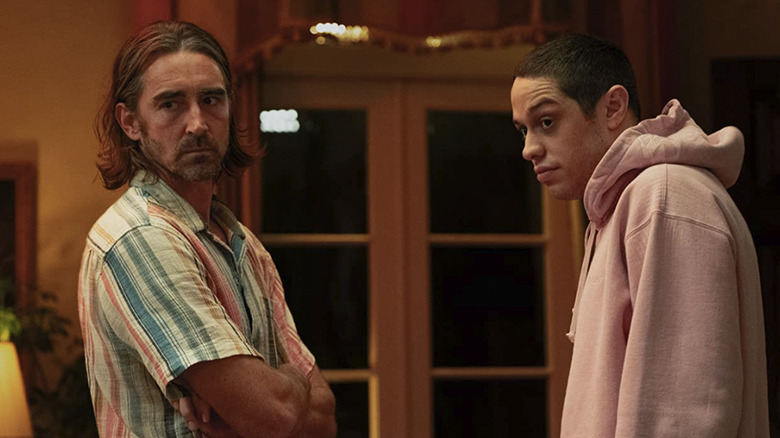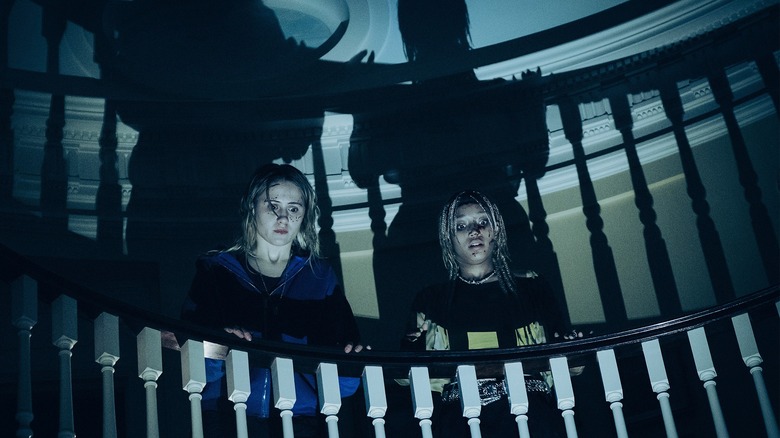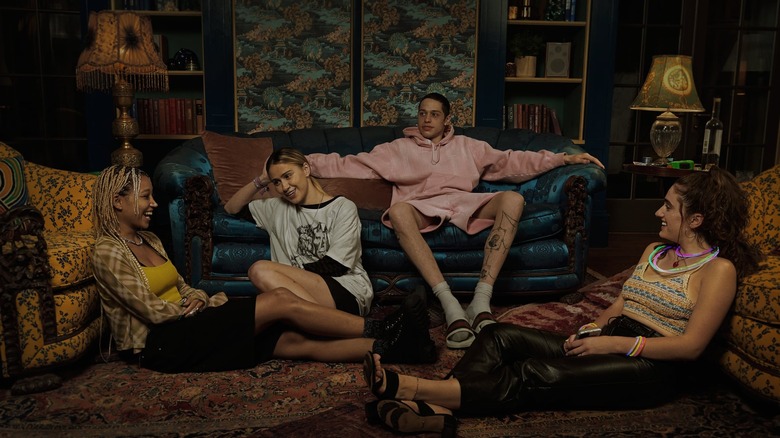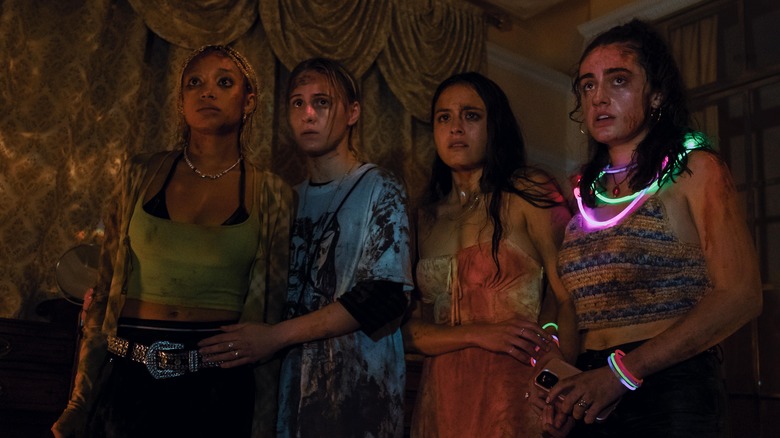Bodies Bodies Bodies Director Halina Reijn On Her Inspirations And Lighting With Cell Phones [Interview]
"Bodies Bodies Bodies" director Halina Reijn wasn't sure about making a horror movie. It's not a genre she's been drawn to throughout her career, which has ranged from writing, directing, and acting on and off the stage. For her first American film and sophomore directorial effort, she decided to have some genre fun and throw in a few ingredients of her own to make, as she put it, "a cocktail" that audiences will hopefully enjoy.
The film follows a group of Gen-Z friends trying to find a killer among them. Reijn's film has a wicked sense of humor about itself. The lean and mean A24 release is about the horrors of insecurities, rivalries, and unspoken truths. Recently, Reijn told us about some of the familiar horrors and themes she wanted to explore in "Bodies Bodies Bodies."
'This is not a classical horror film at all'
With the house and all these characters coming in and out of the picture, were you relying a lot on your education and experience in theater?
I think it really helped me to decide at a certain moment, because it is only my second film. Of course, coming to the U.S. was very intimidating like, "Oh my God, I have to prove myself here in another language." I only did "Instinct," and that totally came out of my own crazy brain. Then I did a TV show, "Red Light," that came out of my crazy brain. So I was just not used to working with an idea that wasn't originally mine. When I decided to totally make it my own, and be unapologetic about that, I wanted it to be about group behavior, and I want it to be primal, and are we beasts or are we civilized? Is the killer inside of us or outside of us?
All those elements really make me feel so liberated once I accepted, "Okay, I'm just going to take this idea about young people and a game, and I'm going to totally create it into something that I would want to see." Even though hopefully funny, at the same time, I hope there's also a darker undercurrent about human nature and who are we in this day and age of technology? How do we communicate, and how do we exclude people, and include people, cancel culture and all of those things that we're struggling with on a daily basis?
Your first American movie is very American.
I know. I think also, us getting Sarah DeLappe to work on the script with me was amazing, and she is, of course, very American. She is from the same background as me, coming from the theater. She's a playwright. I think our combination, we were talking about it yesterday, actually, at the premiere, it was really love at first sight. I think I was so aware of me coming from a totally different culture, and going to make a movie about, a little bit, the class differences in the U.S. In the research, actually, I thought that was the horror to me. I realized if I would've been born here, my life would've probably taken a very different route, because I grew up with hippie parents.
They thought it was really cool to not have any money. They didn't like money, but I had access to everything, because that's just the socialist government that we still have. Here, of course, I find out that you can't really easily access education like that, and that still is in effect. To me, I'm like, "Are you kidding me?" But that is, of course, a very important theme in our film, and in that sense, it is very American.
Which is why Bee (Maria Bakalova) feels like the right protagonist. Most people will identify with her. You can feel really out of place among the rich and in a house like that.
Yeah, absolutely, and the level of the gap between rich and poor worldwide is growing so crazy. You see when we were scouting the house, I mean, I saw some metaphors for greed, and these mansions are just insane. I think we all feel sometimes this feeling of being an alien and not belonging, or with whatever group, whether it's a religious movement, or a political group, or a sports club, or a group of friends, and groups are just intimidating and scary. Of course Bee thinks, "Oh my God, they're all so beautiful, and they talk so fast, and they're so funny and ironic, and I don't know what to do." But at the same time, within half an hour, we find out that they're all lost, and they're all lonely, and they all hate themselves. They all have a very complicated relationship with their own body and their own soul.
For me, the horror of this movie is the idea of, people don't think about you as much as you think they do, but what if they do?
Yeah, I love that. To me, the horror is totally that, because of course, this is not a classical horror film at all. I feel the horror is like, to me, "Who's Afraid of Virginia Woolf?" It was one of the films we watched as a group for the acting style. It is also a horror film. It's psychological horror, a couple almost destroying each other with a younger couple watching them. It's so exciting to watch, but it is mental horror. I feel mental horror is way more my horror than any other form of horror.
Yeah, that claustrophobia of, "Oh God, I'm stuck with these people."
Exactly, and that's actually even more scary, in a way. What I also find very telling is that at the very end Bee really wants to see a phone and is obsessed with the text messages. It's jealousy, it's like the green monster that comes out instead of, like, "Listen, there are dead bodies everywhere, let's talk about that." I think it's so human — in the face of death, in the face of war, in the face of people starving, we are all concerned with these small little things. I think that's just how we are. We are so, in that sense, also a little bit pathetic.
'Am I going to make a slasher film? What?'
Were you thinking a lot about Mike Nichols while making "Bodies Bodies Bodies?" He was so skilled in his staging, in theater and film, of just characters coming in and out of rooms.
Obsessed with him, and his work, and his themes and how he ... everything you are saying, his work is just so elegant, but also so animalistic, and primal, and the blocking. Also, "Who's Afraid of Virginia Woolf?" was so modern, even if you look at it now, because of the camera movement. Also, that feeling of being trapped in one house, one location with each other, and just this feeling that it is as if they are improvising everything, even though they're not, it feels so natural and organic. I think that's something that I really love. Especially if you want to portray a friends group and if you want to portray youth culture, remember the film "Kids" in the '90s, or a film that I keep referencing that no American knows is "Don's Plum," it's a Leonardo DiCaprio, Toby Maguire film that they wanted to get rid of, and so we see it in Europe.
I've obviously never seen it.
It is amazing. It's also them just talking, overlapping, it's a great film about youth culture. It's so wonderful. I don't understand why they are not super proud of it. That was my biggest pitch to A24, like, "That's what I'm looking for, that kind of dynamic, that energy, that believability." Then within, of course, the ritual of the slasher film that is fun and crazy, and we all know what's going to happen, because we've seen so many of them. I think that structure gave me freedom in the end, although it was intimidating in the beginning. I was like, "Am I going to make a slasher film? What?" But then I really I loved it, because I found that it's clear what will unfold. But at the same time, we can put in all these contemporary layers and make it honest, and truthful, and exciting, and funny.
So "Don's Plum," it's easy to access where you are?
In America, it's not accessible at all. I found it in a very obscure DVD shop in the Netherlands.You can't see it, because I've been talking about it and nobody knows about it. But it's so fascinating to me, because they are huge stars and I'm just intrigued how that happened. It's a great film. For me, "Heathers," "Kids," "Don's Plum," those were all great inspirations for me to watch first.
Of course, "Who's Afraid of Virginia Woolf?" But that was more I wanted to show my girls the acting style that I was looking for, and the beyond ego, where Liz Taylor, she doesn't care anymore what she looks like. When it comes to acting, I really feel the safest as an actress, but also as a director, when everybody is able to let go of their vanity, and their ego, and their character, and their acting skills. No, it's about what we're telling as a whole, the story, the group, the mood, and so that is how I try to navigate them through the process.
What other movies did you have the cast look at?
I told Chase [Sui Wonders] to watch Isabelle Huppert, who's one of the greatest actresses of all time, and this film, "The Piano Teacher." Chase, because she has this sadomasochistic dynamic with Pete Davidson in the film, where she's kind of like a dolphin who beaches herself. She keeps kind of like, "Well, no." I give them all different ... I said to Amandla [Stenberg], "Read 'Platonov' by Chekhov." I don't want to make it too heavy, but I just think it's great to be inspired. Of course, a big thing that inspired Sarah and me is Cassavetes. His films all look like they're completely improvised, he has a lot of group scenes in them, and they're all so organic and he's far ahead of his time, so real. So, I told them, "Please watch those, and let's talk about those, too."
So going outside of the genre.
Yeah, outside of the genre, and I feel, also, because I'm not an expert in horror, and I think my biggest horror experience was doing on stage Bergman's "Cries and Whispers," which is a pretty scary film. But that's also a little bit outside of the normal horror genre. I watch Ari's films also, because he is my dear friend, Ari Aster, but I get scared. I need to watch them with other people. I love his films, I mean, I can only watch those in awe, and I see also how horror can be very liberating for a creator. But, for myself, I just thought it would be great to make a dark comedy, basically. Take everything that I know from my own background and Sarah's background, and just try to make a little cocktail, and hope that people will enjoy it.
'All we have is their iPhone lights'
What challenges did you and your cinematographer have with staging and shooting in the house?
My DP came on board the minute I got the job. Even before Sarah came on board, I called my DP [Jasper Wolf], I was like, "Hey, we're going to do this." He did my first film, "Instinct," with me. He did also a lot of films that I acted in, so I know him very, very well. He's the same as me where he's almost like a war photographer. He did a film called "Monos," it's a South American film, beautiful film, and you can actually see that he just jumps into a waterfall with a group of young people. He filmed it, it was like, "What are you doing?" If you know a little bit about technique, oh my God.
So, he's wild, and he's very intuitive, and incredible with actors. He has a certain style of working, so we prepare for months. He would be there when I was still writing the script with Sarah, and really thinking about every step of the way. So, for instance, we came up with the idea that they would have a hurricane party, because we knew we wanted to have 70% of the film take place in the absolute dark, which is of course a f***ing challenge by itself. So, we thought if it's a hurricane party, they at least have flashlights, they at least have some emergency lighting. So, I implement things in the script that I discuss with him, and we're already developing the lighting plan in Amsterdam, way ahead, and making drawings.
Then we locked ourselves into that house for two weeks with stand-ins, and I act everything out with the stand-ins, and we made the whole choreography. So, Jasper and I, we have a plan so that when they step in, the real actors, for the rehearsals, we have a plan. We are also so prepared that we can to really listen to their plans, instead of us panicking like, "Oh, no, it's going to go our way." No, because we have a plan, so we are like, "Okay, so what do you want? What do you feel right now?" That really helps them feeling involved, and also really, truly collaborating with us, and making it believable and authentic.
How challenging is it shooting in the dark with flashlights?
Oh my God, and them having to light each other, because often all we have is their iPhone lights, and then they have to light their co-stars, which is, of course, they're already acting, they have so many things that they have to think about, the blocking, the this, the that. Then it's like, "Can you put your head up, because you have a head lamp and I need to see Amandla right now?" But it was so hard, but they also, they really went for it and they ... yeah, there were so many elements, and then, again, it made them feel part of the whole process, instead of just coming in, doing their little acting thing for the camera.
No, it was real, long takes. Jasper is ... it's not like they know where the camera's going to be with Jasper, it's handheld, so at any time they all have to be alert and they all have to be there. But yeah, shooting in the dark, it was a challenge, but it also made it very real. We're both, Jasper and I, we really like to then make it super real, so not use any extra lights. Make only the little emergency lighting, and for the cast ... they had a real experience, they always say as a joke that they trauma-bonded because it's so intense.
Which almost sounds like a joke from the movie.
[Laughs] I'm like, "Well, be careful what you're saying." But no, but I do feel that we did create an atmosphere in which they had a true experience. I think you feel that when you watch the film. It's the chemistry between them, the sexual chemistry, even if there's not a lot of sex scenes, but there's such a sensual, primal energy between them. It's just so exciting to watch.
"Bodies Bodies Bodies" is in limited theaters now and expands to wider release on August 12, 2022.



